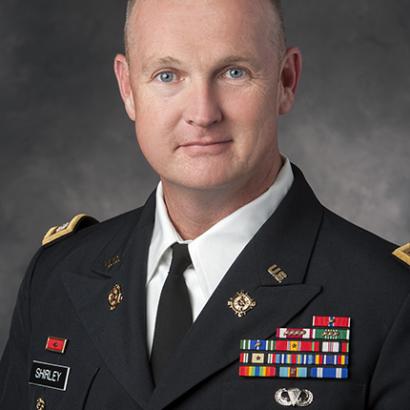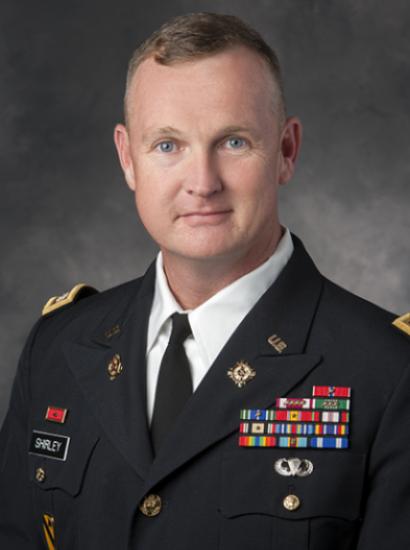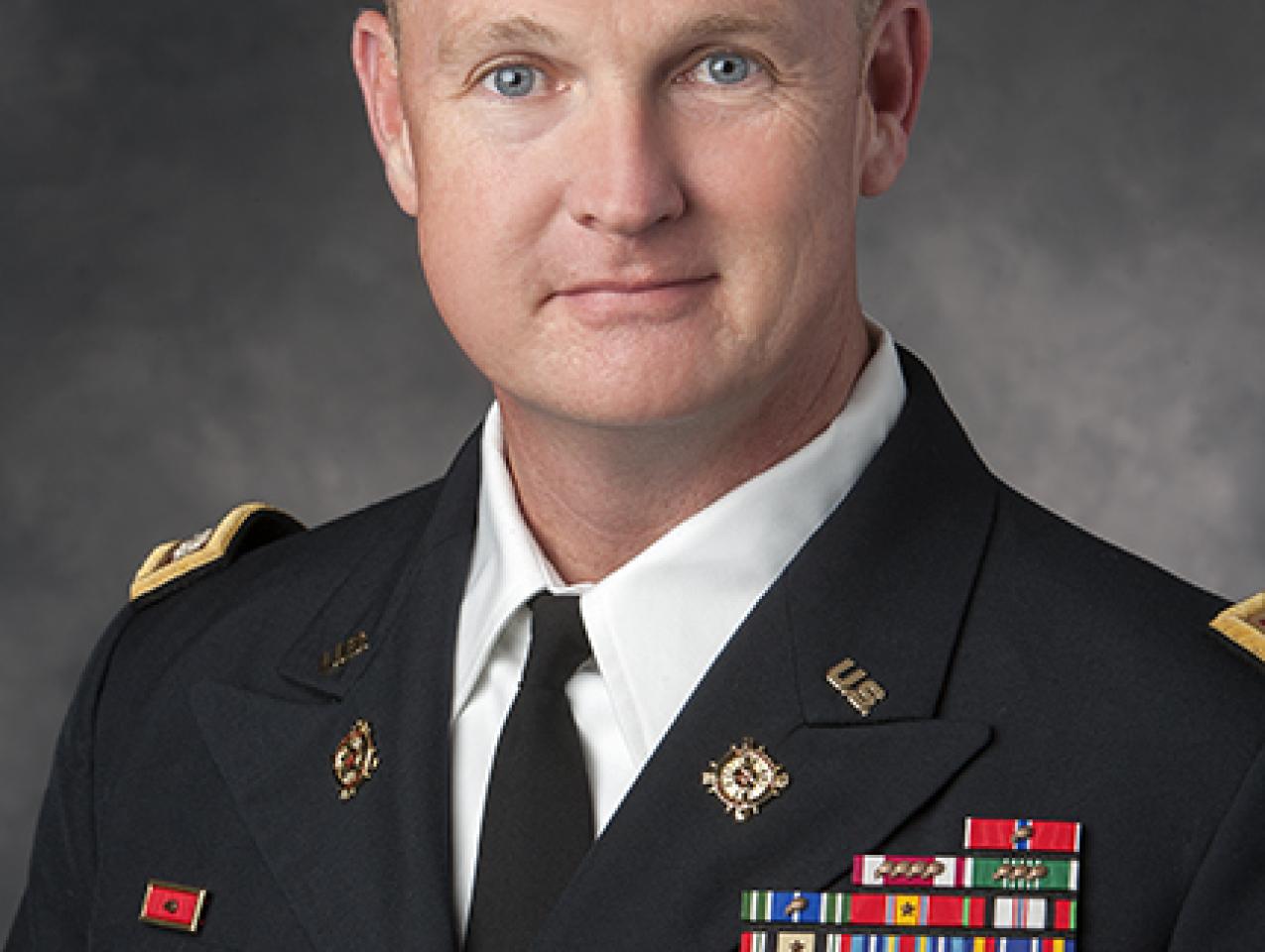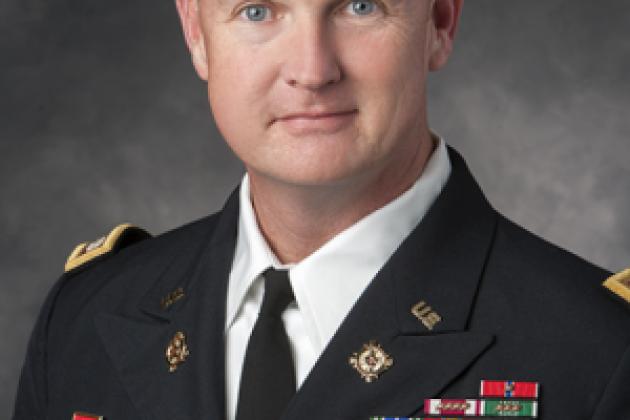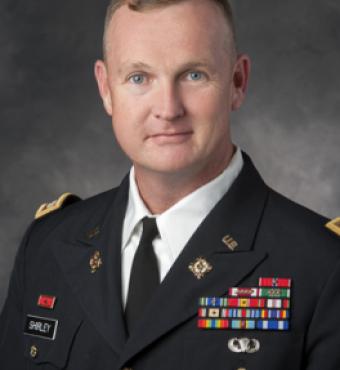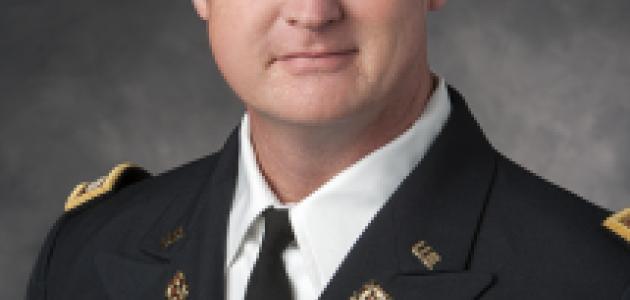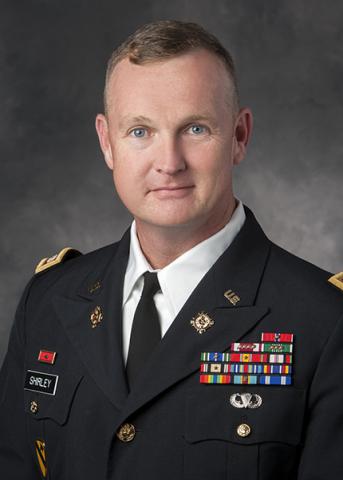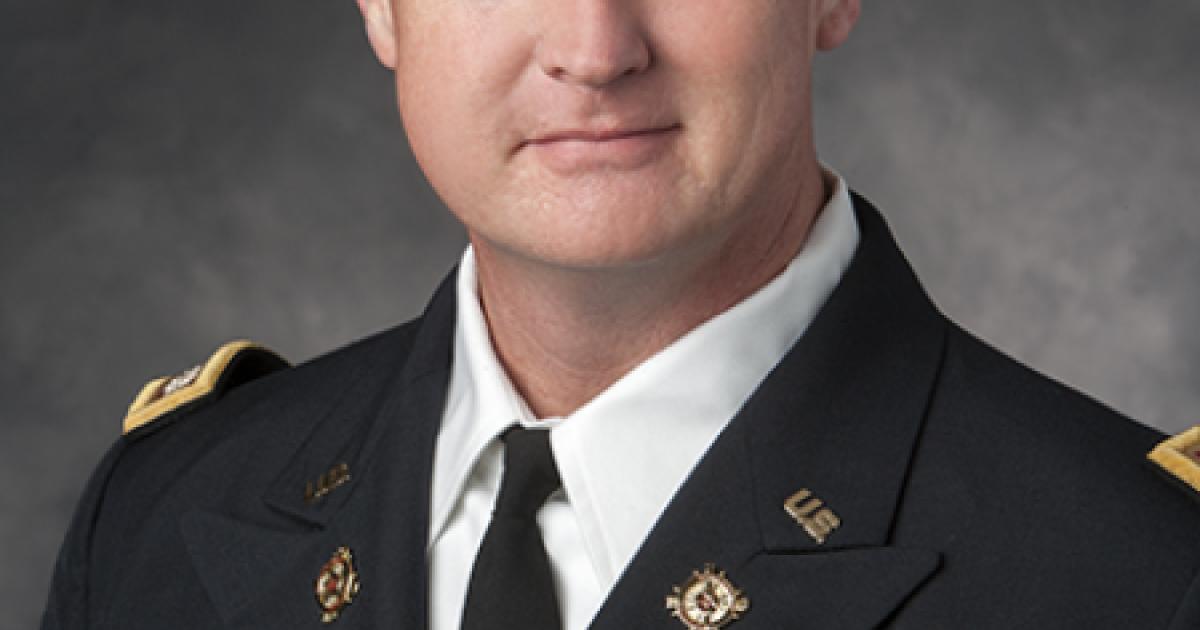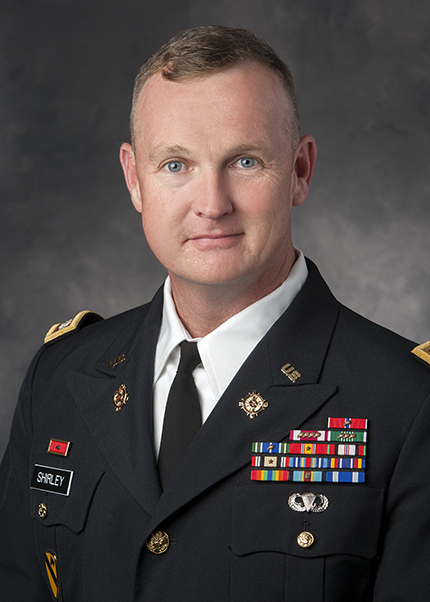
Lieutenant Colonel Eric Shirley is a soft-spoken man who chooses his words carefully and precisely. He seems more reflective than others in his cohort of 2013-14 National Security Affairs Fellows at Hoover - “we don’t mess with Eric as much” one fellow commented affectionately. When considering that his career spans twenty years in the US Army as a logistician, those characteristics fall into place. Throughout his assignments, which include the Fourth Infantry, First Cavalry, and First Infantry Division, where he commanded the 193d Brigade Support Battalion, and most recently Bagram Airfield, Afghanistan, from March 2012 to March 2013 with the First Infantry Division, he has specialized in a critically important but unnoticed aspect of most depictions of the military: ensuring that soldiers have the right material and communication equipment at the right time. At Hoover, Shirley is applying his twenty years’ experience on a research project that is examining the army reforms in defense logistics focusing on in-theater distribution. His tentative argument is that, although we have made effective reform efforts, there are still four key areas in which we have to consolidate our gains in the post Operation Iraqi Freedom period: policy and doctrine; organizational headquarters and their relationships; training and material, and logistics information systems.
Shirley has generously agreed to share with folks at Hoover more about his Army experiences and life thus far at Hoover. This is the first in a series that will feature all 2013-14 National Security Affairs Fellows.
Why did you join the army?
Both of my grandfathers served in the US Army, they were World War II era veterans, and I think I appreciated their example of service to the Nation. That was certainly part of it from an inspirational focus. From a practical perspective, when I made it through high school, the best way for me to continue on to college was through an army ROTC scholarship, which I took to the University of Arizona. So from the time I was about seventeen going forward, I have always been committed to being a Soldier. In reflection, it has been a great career and I certainly would not have changed it if I could go back and reconsider. The army has given me my undergraduate and graduate degrees, I’ve certainly seen the world, I’ve been deployed to both Iraq and Afghanistan. Certainly within my career field of logistics, the Army has provided a career path going forward for a career after the army as well.
If you hadn’t joined the military, what career would you have chosen?
That’s a tough one. Other than a few typical manual-labor type summer jobs in middle school and high school, I have not worked outside the Army. Since I’ve been in the Army, I’ve really enjoyed my time in academic settings. Whether at Fort Leavenworth in Kansas or as a professor of military science at Truman State University, I’ve always appreciated the time to sit and reflect. I can’t imagine what a sixteen- or seventeen-year-old version of me would have done outside the Army. It could have been something that was team and purpose and mission-oriented, like law enforcement or the fire department, but that’s a stab in the dark.
How many deployments have you had and to where?
I’ve been to Iraq twice, in 2003 and 2006 to 2008, and then Afghanistan from 2012-2013. The first deployment I was a Captain, second deployment I was a Major, and the third deployment I was a Lieutenant Colonel, so it seems like every time I’ve been promoted it was time to go on another deployment. But that is not atypical for an Army officer. Since 2001 you will find that many Soldiers have gone three or four times.
What was the biggest challenge of your career and why?
I would say that there was at least one challenge that I had to deal with early on. It was when I was assessed into the logistics field as a cadet. There was a big mismatch with my perceptions of what I wanted to do in the Army, I had asked to be an aviator or assigned to one of the combat arms, and the way the assessment system works I was “drafted” into logistics. So getting over that early on was probably my initial and lesser challenge by far. I’ve had lots of opportunities to lead in the army, and my biggest challenge with each of those I think, was the struggle to dedicate enough time to subordinate development. Young, twenty-two year-old lieutenants dealing with a very technologically demanding, deployment driven, and personally challenging environment where they are expected to deal with sometimes substantial personnel issues like counseling troops with financial challenges, PTSD or relationship issues. So the biggest challenge that I had was making enough time apart from the daily requirements of the mission to set aside time, take my young officers, and do professional development with them, whether that was an educational format, reading something of significance, taking time to discuss it with them, having them write something that I could give them feedback on, help develop them for the next level of responsibility. I mean there are lots of things that are hard over the course of twenty years, but in looking back on it the thing I wish I had the foresight and the commitment to do better was to spend more time with the young guys. It’s something you have to be very committed to doing.
What do you see as the army’s top challenges in the next few years?
First and foremost is dealing with the fiscal constraints, because for years we knew that there was a looming period of fiscal austerity coming. But I hear our senior leaders talking about significant draw downs and becoming a smaller force with the same global responsibilities; balancing that tension will be a challenge. A large part of the army is now going to be experiencing tiered readiness, which will create an army of haves and have-nots. So really now I think I’ve captured a couple of challenges, the budget uncertainty at the department level, and the disparate impacts as you follow that out to the end of the whip in the institution. There are very few units that will have all the resources that they need to properly train, but the vast majority of the army will have to make do with whatever is left over. So as a colonel that is going to be returning to the field when I leave Hoover, articulating that disparate strategy will be a challenge. The Army owes the American people, the assurance that when their sons and daughters are sent to combat that they have the right equipment and the right training ahead of time. So I’ve touched on the three things that are immediately resulting from the nation’s fiscal challenges and how that will impact the Army.
What was it like to adjust from your last job to the Hoover fellowship?
Well it was a beautiful change of scenery. My last job was serving in Bagram, Afghanistan, for a year. Coming here to Hoover, well the climate is beautiful, no one is shooting at you, and you just have this wealth of intellectual capital that is Hoover. It’s also been a great opportunity to reconnect with my own family. They’ve been through separations before; I’ve missed birthdays and anniversaries and lots of things . . . now I’m able to get home for soccer and swimming practice and go to all the soccer games and really be there at a critical time when my daughters are growing up. So the change has been a drastic change but all in a pleasant way.
What’s something you have learned since coming to Hoover from a class, a colleague, a fellow, or student that made you think differently?
I really appreciate that Dr. Zegart has an undergraduate mentorship program, and I’ve got a pair of really exceptional young gentlemen that I work with. The thing that I was taken aback with was the level of individual initiative. . . . They’re seniors in an undergraduate program, pursuing honors in international relations or working to start their own company, and I’ve been tremendously impressed with the volunteer work and the professional development they take on themselves. Things I’ve had reinforced for me since I’ve been here is the importance of reflection and critical thinking not being criticism. It’s very instructive to watch the interaction – how ideas are portrayed and developed, whether we are talking about the various task forces, watching how the policies are developed which could take a long time, how the arguments and ideas are represented and countered with critical thinking. I think hopefully that will put its imprint on all of us as we go back out and get back into that urgent, rushed environment to provide results or input for senior leaders.
What do you like to do in your spare time?
Well my spare time is largely consumed by going to swimming and soccer practice, going to school events, soccer games, swim meets, which is great, it’s exactly what I’d like to be doing. When we’re not doing work here at Hoover, I like to spend time with the other fellows, because they have a wealth of military and world experience, it’s good to exchange amongst the services.
What’s a funny story about your fellow NSAFs that you would like to share?
(Laughing) I don’t know that I can . . . we have some guys with targeting and counterterrorism experience, I might wind up disappearing. We went to a tailgate party at one of the football games and we stood out and got drenched in the pouring rain and there wasn’t an umbrella or rain jacket to be found. We fell prey to our beautiful environment here and forgot our always-be-prepared-motto and stood there and just got soaked. That was about the funniest event that we’ve had here that I can talk about and that’s suitable for publication.
What does leadership mean to you and how do we develop it in others?
I think that leadership is truly embodied by the Army’s four Cs of leadership: character competence, commitment, and candor. I think that’s a great summation. What’s most important to me is a sense of commitment–not from a contractual or legal obligation sense, but I think that you find leaders that have a notion that it is incumbent upon the individual to give of themselves to the team level. This is an age-old formulation in the Army. I think it is best developed over the long term by good role models. That’s why as a leader you have to model the best behavior you can and interact with the future of the organization in a direct way. I’ve been very fortunate to have had great mentors and had several leadership opportunities myself in the Army. I hope to be able to serve in a leadership position again, in order to give back to the institution that has meant so much to me and help to hopefully provide a positive impact on future Army Leaders. I guess that’s the best quick summation on leadership that I can give.







